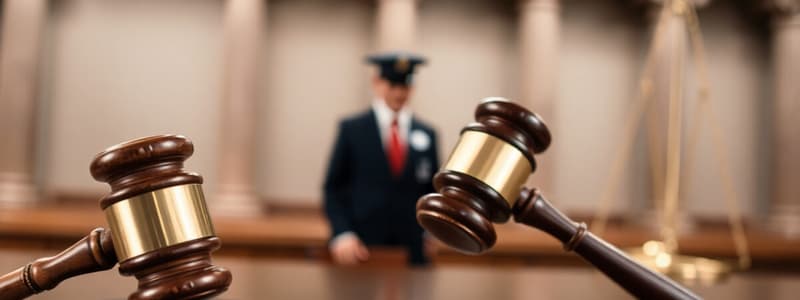Podcast
Questions and Answers
Explain the ethical difference between the obligations of a prosecution attorney versus a defense attorney in a criminal trial.
Explain the ethical difference between the obligations of a prosecution attorney versus a defense attorney in a criminal trial.
A defense attorney is obligated to zealously represent their client, even if they believe them to be guilty. A prosecutor has a responsibility to do justice and should not prosecute someone they believe is not guilty.
Define the term 'malice aforethought' and list the different mental states that it encompasses.
Define the term 'malice aforethought' and list the different mental states that it encompasses.
Malice aforethought is the mental state required for murder, encompassing intent to kill, intent to inflict grievous bodily harm, extremely reckless indifference to human life, or intent to commit a dangerous felony.
In the context of a trial, what is the 'burden of proof,' and on whom does it typically rest in a criminal case?
In the context of a trial, what is the 'burden of proof,' and on whom does it typically rest in a criminal case?
The burden of proof is the obligation to prove one's assertion. In a criminal trial, it generally rests on the prosecution, who must prove the defendant's guilt beyond a reasonable doubt.
Distinguish between 'direct examination' and 'cross-examination' in a trial setting.
Distinguish between 'direct examination' and 'cross-examination' in a trial setting.
What is the purpose of an 'opening statement' in a trial, and what are the limitations on what an attorney can do during this statement?
What is the purpose of an 'opening statement' in a trial, and what are the limitations on what an attorney can do during this statement?
Define 'criminal intent' (mens rea) and explain why it is a necessary element for most crimes.
Define 'criminal intent' (mens rea) and explain why it is a necessary element for most crimes.
Describe the difference between a 'felony' and a 'misdemeanor,' focusing on the potential penalties associated with each.
Describe the difference between a 'felony' and a 'misdemeanor,' focusing on the potential penalties associated with each.
Explain the concept of 'reasonable doubt' and why it is crucial in criminal trials.
Explain the concept of 'reasonable doubt' and why it is crucial in criminal trials.
Describe a situation where causing the death of another human being would not be considered a criminal act.
Describe a situation where causing the death of another human being would not be considered a criminal act.
What is an 'affirmative defense,' and who bears the burden of proving it in court?
What is an 'affirmative defense,' and who bears the burden of proving it in court?
How does the crime of murder differ from the crime of manslaughter?
How does the crime of murder differ from the crime of manslaughter?
Describe what 'impeachment' is in the context of cross-examination and give an example.
Describe what 'impeachment' is in the context of cross-examination and give an example.
Explain the purpose of a 're-direct examination' and when it occurs during a trial.
Explain the purpose of a 're-direct examination' and when it occurs during a trial.
In the context of a trial, what is a 'stipulation' and why might parties agree to one?
In the context of a trial, what is a 'stipulation' and why might parties agree to one?
What is the role of the 'jury' versus the role of the 'judge' in a trial?
What is the role of the 'jury' versus the role of the 'judge' in a trial?
Define defense of 'Necessity'.
Define defense of 'Necessity'.
In legal terms, what does 'homicide' mean, and is it always a crime?
In legal terms, what does 'homicide' mean, and is it always a crime?
What is the purpose of a 'closing argument' in a trial, and when does it occur?
What is the purpose of a 'closing argument' in a trial, and when does it occur?
During the evidence presentation of a mock trial, what is the limitation of a witness testimony?
During the evidence presentation of a mock trial, what is the limitation of a witness testimony?
What is a 'rebuttal' argument, and which side presents it?
What is a 'rebuttal' argument, and which side presents it?
Flashcards
Prosecution
Prosecution
The side bringing a case against another party; in criminal law, the side bringing a person to trial on criminal charges, typically the government.
Defense
Defense
The person charged with a crime and the side representing them, disputing the charges' correctness.
Crime
Crime
An act or failure to act that violates a law for which a penalty is set by the government or state.
Felony
Felony
Signup and view all the flashcards
Misdemeanor
Misdemeanor
Signup and view all the flashcards
Homicide
Homicide
Signup and view all the flashcards
Murder
Murder
Signup and view all the flashcards
Manslaughter
Manslaughter
Signup and view all the flashcards
Malice Aforethought
Malice Aforethought
Signup and view all the flashcards
Justifiable Homicide
Justifiable Homicide
Signup and view all the flashcards
Necessity
Necessity
Signup and view all the flashcards
Affirmative Defense
Affirmative Defense
Signup and view all the flashcards
Stipulation
Stipulation
Signup and view all the flashcards
Exhibit
Exhibit
Signup and view all the flashcards
Presumption of Innocence
Presumption of Innocence
Signup and view all the flashcards
Reasonable Doubt
Reasonable Doubt
Signup and view all the flashcards
Criminal Intent
Criminal Intent
Signup and view all the flashcards
Jury
Jury
Signup and view all the flashcards
Judge
Judge
Signup and view all the flashcards
Opening Statement
Opening Statement
Signup and view all the flashcards
Study Notes
- These notes cover key legal concepts and procedures relevant to a trial.
Prosecution and Defense
- Prosecution refers to the side bringing a case against another party.
- In criminal law, the prosecution is the side bringing a person to trial on criminal charges.
- The government, state, or people (e.g., Republic of Rome) brings criminal charges, not private individuals.
- Private individuals cannot prosecute a criminal case.
- The defendant is the person charged with a crime.
- The defense represents the defendant and disputes the correctness of the charges.
- Defense attorneys are obligated to represent their clients zealously, even if they believe them to be guilty.
- Prosecutors are responsible for doing justice and cannot prosecute someone they believe to be not guilty.
Crime and Classification
- A crime is an act or failure to act that violates a law, with a penalty set by the government or state.
- The government must prove each element of a crime beyond a reasonable doubt.
- Failure to act can be a crime in certain situations.
- A felony is a serious criminal offense usually punishable by a prison sentence of more than one year, like arson, murder, and kidnapping.
- A misdemeanor is a less serious criminal offense than a felony and is punishable by a prison sentence of one year or less, or a fine or penalty.
Homicide, Murder and Manslaughter
- Homicide is the killing of one human being by another, and it is not necessarily a crime.
- Soldiers in wartime, police officers lawfully doing their jobs, and people acting in self-defense are examples of "legal" homicide.
- Murder is the unlawful killing of a human being with malice aforethought.
- Manslaughter is the unlawful killing of a human being without malice.
Malice Aforethought and Justifiable Homicide
- Malice aforethought is the required mental state for murder, encompassing:
- The intent to kill
- The intent to inflict grievous bodily harm
- Extremely reckless indifference to human life
- Intent to commit a dangerous felony (felony-murder)
- Justification is a defense when the defendant acted in a way the law does not seek to prevent..
- Necessity is a justification defense for a person who acts in an emergency they did not create and commits a harm less severe than what would have occurred otherwise.
- An affirmative defense is a defendant’s assertion of facts that, if true, will defeat the prosecution’s claim.
- The defendant bears the burden of proving the affirmative defense.
Evidence and Legal Principles
- A stipulation is an agreed-upon factual situation or exhibit.
- An exhibit is physical evidence offered as evidence (e.g., clothing, maps, diagrams).
- In a criminal trial, the defendant is presumed innocent until proven guilty.
- The prosecution must prove the defendant’s guilt beyond a reasonable doubt.
- The defendant has no obligations unless presenting an affirmative defense.
- Reasonable doubt is the standard of belief a jury must have to convict a defendant in a criminal trial; it does not require absolute certainty.
- Criminal intent (Mens Rea) is the intent to commit a forbidden act without justification, excuse, or defense.
- It is the intent to commit the act, not necessarily the intent to commit a crime.
Trial Roles and Procedures
- A jury is a body of people selected to determine facts and determine the truth.
- The jury decides the facts of the case.
- A judge presides over the trial and decides the law in the case, making legal rulings on objections and evidence.
- An opening statement is made by the prosecution and defense at the start of the trial, outlining what they hope to prove.
- Opening statements are not evidence, and attorneys cannot argue their case here.
- Direct examination is the examination of a witness by the attorney who called them.
- Cross-examination follows direct examination, with questions asked by the other side.
- Impeachment is a form of cross-examination used to discredit testimony.
- Re-direct examination allows the direct examiner to follow up on matters raised during cross-examination.
- A closing argument is a summation by each side to the jury at the end of the evidence phase.
- Rebuttal is an argument by the prosecution that responds to the defense’s closing argument.
- An objection is the means by which an attorney informs the judge that a question, response, or evidence should not be presented to the jury.
Mock Trial Specifics
- Reasonable inference only: In a mock trial, a witness can only testify to what is in the facts given or what can be reasonably inferred from those facts.
- This rule applies specifically to mock trials, not real trials.
Studying That Suits You
Use AI to generate personalized quizzes and flashcards to suit your learning preferences.




